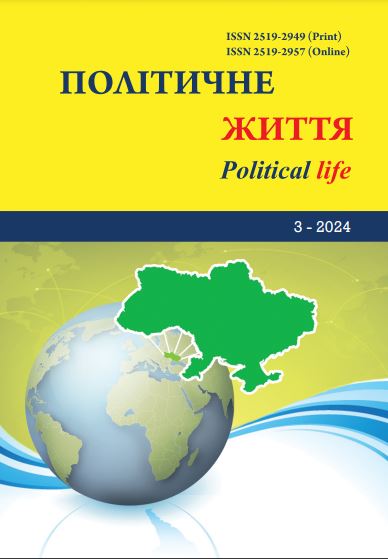An individualistic approach to the research of black PR in election campaigns
DOI:
https://doi.org/10.31558/2519-2949.2024.3.10Keywords:
individualistic approach, black PR, manipulation, election campaigns, political processes, strategies, toolsAbstract
The article draws attention to the individualistic approach in the study of black PR in election campaigns, while emphasizing that black PR can be considered as a form of activity for studying the mechanisms of managing political processes and forecasting public demand for a political product, which includes the dissemination of disinformation, manipulation in the information spaces, deception and other methods to achieve certain political goals. That is why the individualistic approach, which emphasizes the role and influence of individuals in political processes and systems, is so important for the characterization of black PR. It has been proven that the individualistic approach considers political phenomena such as decision-making, the formation of political ideas, conflicts, as well as the interaction between people and political structures through the prism of the actions and influence of individuals, and can also analyze the role of leaders, political activists, voters and other participants political process in the formation and change of political systems. It is substantiated that the individualistic approach considers personal characteristics, motivations, values, interests and actions of individual people as key elements of political dynamics. It often compares different individual strategies and responses to political events and changes, helping to understand how individuals influence political processes and systems. Because of this, it can be used in the study of the influence of black PR during election battles. The article states that the study of the tools used in black PR based on an individualistic approach can help to better understand the phenomenon of black PR, its functioning mechanisms and contribute to the development of strategies to counter this phenomenon. At the same time, it is emphasized here that this approach is unethical and can have serious consequences for the participants of the election process, as well as for democratic institutions in general.
References
Fischer F. (2003). Reframing public policy: discursive politics and deliberative practices. NewYork: Oxford University Press, 280 р.
Rid Thomas. (2020). Active Measures: The Secret History of Disinformation and Political Warfare. London: ProfileBooks, 448 р.
Camacho M. Thee raofpost-truth, post-veracity and charlatanism. Webpage of the Universidad de Navarra. URL: https://www.unav.edu/web/cienciarazon
Wilson Т. (2023). The Impact of Social Mediaon Political Communication. Journal of Communication, 62, 2. P. 363–379.
Pomerantsev P. (2015). This Is Not Propaganda: Adventuresin theWar Against Reality. Public Affairs, 256 р.
Hobbs Tomas. (2000). Leviafan, abo Sutʹ, budova i povnovazhennya derzhavy tserkovnoyi ta tsyvilʹnoyi. Per. Rostyslava Dymertsya ta in. K.: Dukh i Litera, 606 s.
Lok Dzhon. (2020). Dva traktaty pro pravlinnya. Per. Pavla Sodomory. K.: Nash Format, 312 s.
Veber M. (1998). Poklykannya do polityky. Sotsiolohiya. Zahalʹnoistorychni analizy. Polityka. Per. O. Pohoriloho. K.: Osnovy, 532 s.
Veber M. (1994). Protestansʹka etyka i dukh kapitalizmu. Per. z nim. O. Pohoriloho. K.: Osnovy, 273 s.
Lasswell Harold. (1960). The Structure and Function of Communicationin Society. Mass Communications. Ed. by Wilbur Schramm. Second edition. Urbana, Chicago, London: University of Illinois Press, 695 p.
Lasswell Harold. Politics: Who Gets What, When, How. URL: https://www.unav.edu/web/cienciarazon
Ellul J. (2015). The PoliticalI llusion (Jacques EllulLegacy). Wipfand Stock, 298 р.

